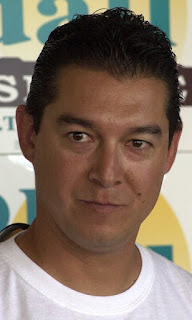 This is rookie State Senator John Sapien, D, Sandoval County.
This is rookie State Senator John Sapien, D, Sandoval County.He led a parliamentary procedural charge using Senate rules Saturday night that has put a speed bump in the road to public access in allowing the public to watch the State Senate activities on the Internet.
Sen. Mark Boitano’s bill, SB 401 and resolution, SR 3 addresses webcasting. The issue has been addressed since passage of a different sponsored Boitano action back in 2005. Boitano is a Republican from Bernalillo County.
On Saturday evening when Senate Resolution 3, “Senate Live Audio and Video Web Streaming,” came to the floor, Sapien was prepared to introduce three amendments.
Sapien first complaint was about the use of legislative council generated video for political purposes. Sapien may not have realized what was in the resolution and bill. Boitano made reference to his Italian heritage and referenced the old Prego spagetti sauce commercial, by telling Sapien, “it’s in there.”
Sapien proposed his first amendment; it created a "senate streaming oversight committee." The amendment failed.
Sapien’s second amendment read:
(b) the live video stream shall be from a single camera installed at the rear of the chamber, positioned and focused so as to capture an image of the chamber that as nearly as possible replicates the view of a member of the public seated in the gallery in such a way that no material on members' desks, computer monitors or similar devices can be read or viewed;The amendment passed. Sapien withdrew his third amendment saying, that with the passage of the second, the last one was unnecessary.
There was a “call of the house,” a parliamentary procedure to compel the attendance of all Senators before the motion on the amended bill be taken. Under this procedure, the doors are locked and the sergeant-at-arms were issued warrants to arrest all unexcused Senators and bring them before the bar. They are permitted to make their excuse. If their excuse is not accepted, the President of the Senate Lt. Gov. Diane Denish would impose a fine that has to be paid in cash before the Senator is allowed to take their seat and act under their charge of office.
This is serious stuff. If a Senator can not be located, or they can not pay their fine, their inability to act is a further violation of their rules requiring them to vote on every issue, unless they have a conflict of interest.
The group of Senators who made the “call of the house,” withdrew their request when it became clear that the sergeants-at-arms were apparently unable to locate the missing members. The floor leader agreed to put off the final vote until the entire Senate was in session.
Santa Fe Reporter Weekly Newspaper writer Dave Maass described Sapien’s amendments as “poison pills.” Amendments to a resolution alter the voting requirements from a simply majority to a two-thirds majority. Apparently legislative watchers, political handicappers and even Senators counting votes indicated that the measure did not have the two-thirds support.
Maass was not the first to indicate that there was poison in the ethics reform well. Democracy for New Mexico’s Barbara Wold’s take on slow moving ethics bills in the Senate Rules Committee.
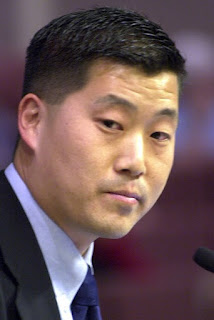 Executive Director for the Center for Civic Policy Eli Il Yong Lee, left, who is also the registered lobbyist for the companion Center for Civic Action, wrote that House and Senate Majority Floor Leaders: Rep. Ken Martinez and Sen. Michael Sanchez, who were proposing legislation that would require organizations engaged in voter registration to be registered.
Executive Director for the Center for Civic Policy Eli Il Yong Lee, left, who is also the registered lobbyist for the companion Center for Civic Action, wrote that House and Senate Majority Floor Leaders: Rep. Ken Martinez and Sen. Michael Sanchez, who were proposing legislation that would require organizations engaged in voter registration to be registered.Lee sees it as another attack on nonprofits, which many see as being involved in political activity in conflict with the IRS’ tax-exempt status.
The two centers: for Civic Policy, and Action, are registered with the Secretary of State’s office as charitable, educational and social welfare domestic nonprofits.
The nonprofits attempt to make a distinction between permissible educational activities and engaging in what is already defined in the law as:
"political purpose" means influencing or attempting to influence an election or pre-primary convention, including a constitutional amendment or other question submitted to the voters;Statutory Chapters in New Mexico Statutes Annotated 1978, Chapter 1, Elections, Article 4, Registration of Electors
1-4-49 Third-party registration agents; registration required; procedures; reports; penalty. Section 1. Section 1-4-49 NMSA 1978
Yet, Lee does not offer a bright line test upon which his nonprofits may rely to determine what is done in the name of education. Others see it more likely a guise for attempting to poison the election pool. There is no bright line; at best, a diffused one.
Lee, and his nonprofit associates have filed a lawsuit to prevent the Secretary of State and the Attorney General from moving to threaten the tax-exempt status of the organizations.
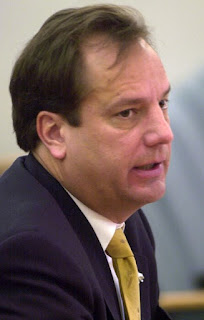 Sen. John Ryan, right, R, Bernalillo County, introduced SB 247, Election Agent Registration Requirements.
Sen. John Ryan, right, R, Bernalillo County, introduced SB 247, Election Agent Registration Requirements.It would add to the requirements already in law and possibly already covered, but not adhered to, so as to clarify:
“C. Organizations employing registration agents or using volunteer registration agents are required to register pursuant to the Campaign Reporting Act.”
Section 2. Section 1-19-26 NMSA 1978 (being Laws 1979, Chapter 360, Section 2, as amended). Ryan’s bill proposes amending it further to read:
1-19-26. DEFINITIONS. As used in the Campaign Reporting Act:
L. "political committee"….
(1) political action committees or similar organizations composed of employees or members of any corporation, labor organization, trade or professional association or any other similar group that raises, collects, expends or contributes money or any other thing of value for a political purpose;The additional relevant language Ryan wants added is:
(4) an organization defined by the internal revenue service as a 501(c)(4) organization or another organization that has unlimited ability to lobby for legislation and participate in political campaigns, whose net earnings are devoted exclusively to charitable, educational or recreational purposes and that also promotes social welfare;The act, on the books already defines:
and
(5) an organization employing registration agents or using volunteer registration agents to register voters pursuant to Chapter 1, Article 4 NMSA 1978.
M. "political purpose" means influencing or attempting to influence an election or pre-primary convention, including a constitutional amendment or other question submitted to the voters;
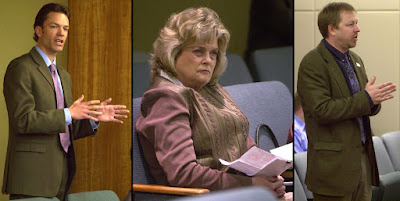 When the audience was asked who opposed the bill, a number of nonprofits rose in adamant opposition, including Policy Director for the Center for Civic Policy Matt Brix, left, Director, American Civil Liberties – New Mexico, Northern Regional Office Diane Wood, center, and Political Director for the Association of Federal State County and Municipal Employees in New Mexico Carter Bundy, right.
When the audience was asked who opposed the bill, a number of nonprofits rose in adamant opposition, including Policy Director for the Center for Civic Policy Matt Brix, left, Director, American Civil Liberties – New Mexico, Northern Regional Office Diane Wood, center, and Political Director for the Association of Federal State County and Municipal Employees in New Mexico Carter Bundy, right.They defended the rights of 501(c)(3) organizations, even though the bill specifically does not mention them.
So what’s wrong with this picture?
Has the place gone to the birds?
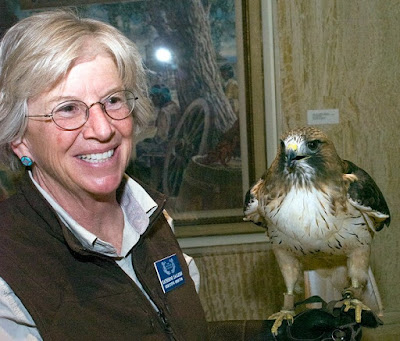 This is the Wildlife Center’s Executive Director Katherine Eagleson with a Red tail hawk in the rotunda on Friday.
This is the Wildlife Center’s Executive Director Katherine Eagleson with a Red tail hawk in the rotunda on Friday. My Take
My TakeThis is rookie State Senator John Sapien, D, Sandoval County. Is there an echo in here?
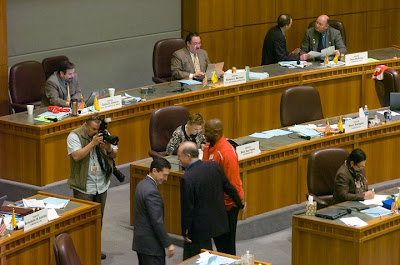 Sapien, center, is being photographed by Albuquerque Journal Photographer Roberto Rosales with Sen. Michael Sanchez and the new University of New Mexico Head Football Coach Mike Locksley, in red.
Sapien, center, is being photographed by Albuquerque Journal Photographer Roberto Rosales with Sen. Michael Sanchez and the new University of New Mexico Head Football Coach Mike Locksley, in red.The Senate invited Locksley to coach their team in the Legislators Basketball game, that evening. The Senate lost to the House 61-51.
What was the Senate thinking, inviting the head FOOTBALL coach to lead the basketball team?
Every once in a while, a bill will comes along that is described as "a full employment act for lawyers." because it will surely be litigated at every turn.

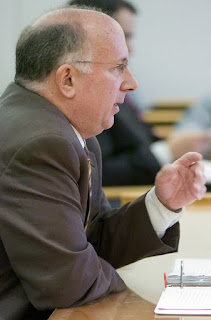 If Boitano’s bill, SB 401 "Legislative Audio and Video Streaming Webcasts," is not passed and the resolution, not made workable, webcasting will stall again. Boitano is a Republican from Bernalillo County.
If Boitano’s bill, SB 401 "Legislative Audio and Video Streaming Webcasts," is not passed and the resolution, not made workable, webcasting will stall again. Boitano is a Republican from Bernalillo County.I am a great believer in open coverage of governments.
I wordsmithed the protocols used by Rep. Janice Arnold Jones in her House effort. They were based on the U.S. House rules as seen on C-SPAN.
However, Boitano’s bill and resolution were severely flawed in my opinion.
The problem was that Senators were trying to dictate professional standards and techniques that should have been made through regulation, not law. The legislation should have required the director of the legislative council service and the chief clerk of the senate who would control the production, to develop protocols and technical standards for the video camera operators to follow. The mission statement being, to webcast the events of the Senate in a way that accurately informs the citizenry of the proceedings of their government. A secondary consideration is to maintain the dignity of the body.
I wrote Boitano early in the process through one of his consultants:
When you speak to Sen. Mark Boitano about his SB401 I suggest that he remove the do's and don'ts and write that the council services shall establish protocols and guidelines for the video/audio coverage of the Senate in keeping with the decorum of the body.Boitano responded, but it seemed the language was locked down.
For every rule that can be written, an exception can be found.
For example:
"(5) at no time shall the live video image be of the gallery; and"
What happens when a Senator wishes to acknowledge some person or group for some outstanding feat or achievement, like driving to Santa Fe, and the Senator points out Ms. Smith's eighth grade civics class?
Let the professionals determine what are the professional standards; then hold them to the standards.
Employees who are properly trained will behave; if they don't can them.
The Senate has purchased high quality, state of the art equipment, but is refusing to implement its use.
 The use of small stationary cameras, like this one used by New Mexico Independent's Gwyneth Doland, don't add to the debate. When the camera can not zoom in on a speaker, it perpetuates the thinking that Sapien relied upon in his sucessfull, one-camera amendment.
The use of small stationary cameras, like this one used by New Mexico Independent's Gwyneth Doland, don't add to the debate. When the camera can not zoom in on a speaker, it perpetuates the thinking that Sapien relied upon in his sucessfull, one-camera amendment. Someone’s going to have to keep an eye on things. This is a Screech Owl from the Wildlife Center in Espanola.
Someone’s going to have to keep an eye on things. This is a Screech Owl from the Wildlife Center in Espanola.Sapien, and those who do not want video webcasting, are going to get it anyway.
The defeat of a reasonable bill will become a full employment act for video webcasting. Next year, instead of attending college classes, I will be lugging my video equipment to the Senate press box and provide webcast coverage of the floor. One of the things that the Senators won’t want is that I will make my own editorial decisions. All the things they fear are fair game, as my work is protected under the First Amendment. Though I am unlikely to go out of my way to make anyone look bad; it could happen.
Just by way of example, on Friday, as we waited hopefully for the webcasting issue to come up, I chose to make a little experimental video. My parameters were: to tape the individual Senators on the floor. I would run tape for 10 to 15 seconds, of each legislator, accepting whatever they did. I would also violate the sections on looking over their shoulders at phones and such.
 This is the Blackberry of a bored government official during the Senate Rules committee.
This is the Blackberry of a bored government official during the Senate Rules committee.The floor came to a stand still when Sen. Lopez asked for some time to have an amendment that was being drawn up. In the interim Majority Floor Leader Sanchez volunteered to tell a joke. It became the underling audio track for this two minute video.
Sen. Nancy Rodriguez owes me a debt of thanks for not using the 11 seconds of her activity. I’m a hard bitten old crime scene photographer, but I couldn’t bring myself to show her. I invoked the Queens rule; No photographs of the Queen after she picks up the first eating utensil, at a meal, until the clinking of a glass to summon the attention before proposing a toast.
Sen. Michael Sanchez has commented to reliable roundhouse sources, about how much he dislikes the continued presence of video cameras during our Senate Rules coverage. If he doesn’t want the Senate to be made to look bad, then maybe he shouldn’t lead the pack.
According to Santa Fe New Mexican's Steve Terrell, who in past years has written about knowing the session is over when Sen. John Pinto, D, McKinley and San Juan Counties will sing “The Potato Song.”
He sang Friday night. It was the second time this session. Pinto, along with President Pro Tempore Timothy Jennings, D, Chaves, Eddy, Lincoln and Otero Counties, are the longest serving members of the Senate, since 1977. Pinto’s probably right; in New Mexico he may well serve as the fat lady. It’s over.
No comments:
Post a Comment